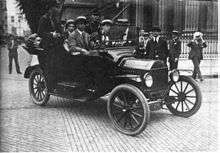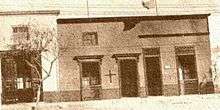Patriotic Leagues (Southern Cone)
The Patriotic Leagues (Spanish: Ligas patrióticas) were nationalistic political groups in Argentina and Chile active from the 1910s to the 1930s. The Patriotic Leagues were characterized by actions against foreigners[note 1] and opposition towards labour movements. They were often constituted as paramilitary groups or secret societies.

In Argentina
The Argentine Patriotic League (Liga Patriótica Argentina) was a Nacionalista paramilitary group, officially created in Buenos Aires on January 16, 1919, during the Tragic week events. Presided over by Manuel Carlés, a professor at the Military College and the Escuela Superior de Guerra, it also counted among its members the deputy Santiago G. O'Farrell (1861-1926). The League was merged into the Argentine Civic Legion in 1931.[1]

In Chile
In Chile the Patriotic Leagues appeared in 1910. Even if they appeared in several Chilean cities they concentrated their activity in the provinces of Antofagasta, Tarapacá and Tacna, those that were annexed during the War of the Pacific (1879-1883). In these places the Patriotic Leagues launched attacks against Peruvian newspapers, societies and citizens contributing to the Chilenization of Tacna, Arica and Tarapacá. The passivity of the Chilean authorities of Iquique helped the Patriotic Leagues to achieve their principal goal: to frighten the Tarapacán families of Peruvian origin.[2] The situation was particularly problematic in Arica and Tacna, where a plebiscite was to determine their national future as either under the rule of Chile or Peru. The plebiscite in the end was never held, and the solution between both South American countries was achieved through the Tacna–Arica compromise.
The Patriotic Leagues caused the expulsion of Peruvians with actions where violence was the principal instrument. Murder, robbery, discrimination and abuses of all kinds were everyday things. (...) It's clear that these were dramatic events in the Tarapacan lands
References
- Patrick Frank. Los Artistas del Pueblo: prints and workers' culture in Buenos Aires, 1917-1935. University of New Mexico Press, 2006. Pp. 206.
- González, Maldonado y McGee 1993
- Núñez Atencio, Lautaro y Maldonado Prieto, Carlos (2005). «Reseña bibliográfica: El Dios Cautivo. Las Ligas Patrióticas en la chilenización compulsiva de Tarapacá (1910-1922), Sergio González Miranda, LOM Ediciones, Santiago, 2004». Chungará (Arica), Universidad de Tarapacá 37 (1). ISSN 0717-7356.